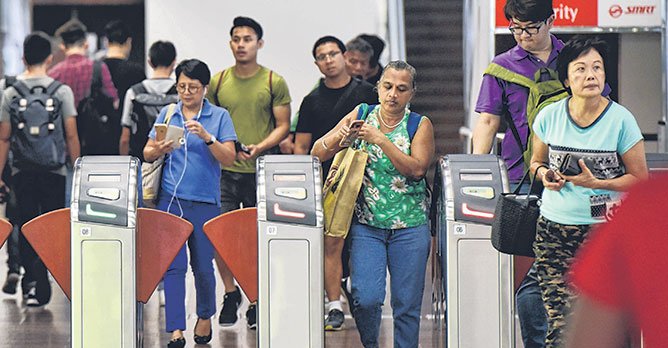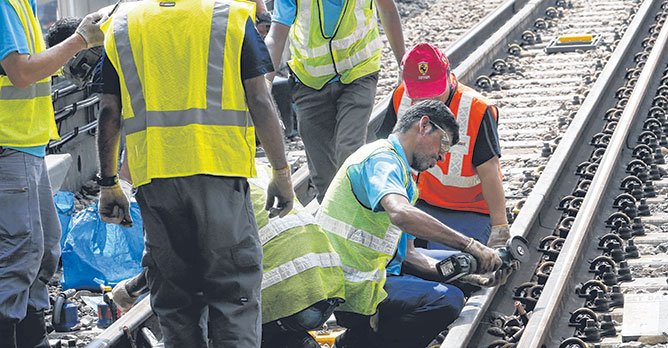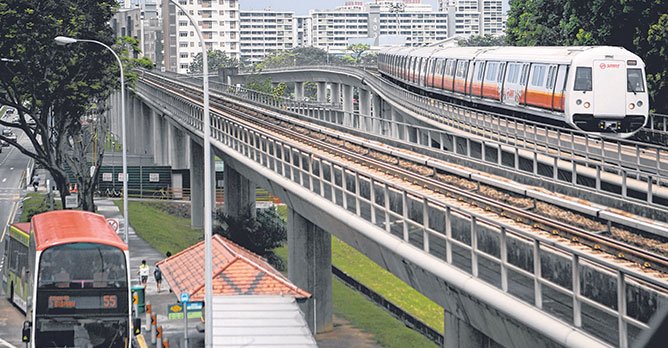SMRT Trains' losses soar to $155m on higher operating costs
01 Aug 2019|3,407 views
Losses are mounting for rail operator SMRT Trains on the back of higher operating expenses. In the 12 months to end-March this year, losses hit $155 million - almost double from a year ago - the firm reported yesterday.

This means for every $1.00 collected, $0.71 went to maintenance-related expenditure. It includes maintenance staff costs, parts and materials costs, depreciation of rail assets and other rail maintenance-related operating expenses, the firm said.
SMRT added that its train business generated a lower revenue of $736.6 million in the last financial year, compared with $743.2 million the year before that. With the way things are going, commuters can expect fares to eventually increase, experts have noted.
Transport Minister Khaw Boon Wan said in Parliament on 8 July that higher fares will be needed in the face of rising subsidies for public transport. He noted that rail operators were in the red, having increased expenditures in multi-year efforts to raise rail reliability.
Mr. Khaw pointed out that the Government subsidises more than 30% of public transport operations, and expects to spend $4.5 billion on operating subsidies over the next five years. This is on top of another $25 billion to be spent on building new lines.
Transport Economist Walter Theseira told The Straits Times SMRT's increased losses were inevitable. "With mature rail systems, the only way your revenue really changes is if fare levels change," he said. "When you have a system where maintenance costs are high because we need to make sure that the system is reliable... and revenue doesn't change, it should be no surprise that your losses go up," he added.
Dr. Theseira also noted that unlike airlines, for example, that can add flights to boost passenger numbers, train operators are not able to easily increase ridership significantly to raise revenues over time. "I think we need to ask ourselves what we actually want out of our transport systems and what we are willing to pay for that," he added. "You can have cheap or you can have good. But to get both at the same time, that is usually not possible."

The figure rose to 51% the year after that and to 62% in the 2017/2018 financial year. Higher staff costs due to a higher headcount and increased electricity costs also weighed down its latest results, the train operator said.
At the group level, SMRT Corporation posted a net loss of $117.1 million for the year to end-March this year, up from $72.4 million a year ago. The firm also announced that it will appoint Mr. Tan Chian Khong as a new board director from today.
Mr. Tan, who has 35 years of experience in the audit industry, will contribute through his expertise in managing financial and investment risks, SMRT said.
Losses are mounting for rail operator SMRT Trains on the back of higher operating expenses. In the 12 months to end-March this year, losses hit $155 million - almost double from a year ago - the firm reported yesterday.

This means for every $1.00 collected, $0.71 went to maintenance-related expenditure. It includes maintenance staff costs, parts and materials costs, depreciation of rail assets and other rail maintenance-related operating expenses, the firm said.
SMRT added that its train business generated a lower revenue of $736.6 million in the last financial year, compared with $743.2 million the year before that. With the way things are going, commuters can expect fares to eventually increase, experts have noted.
Transport Minister Khaw Boon Wan said in Parliament on 8 July that higher fares will be needed in the face of rising subsidies for public transport. He noted that rail operators were in the red, having increased expenditures in multi-year efforts to raise rail reliability.
Mr. Khaw pointed out that the Government subsidises more than 30% of public transport operations, and expects to spend $4.5 billion on operating subsidies over the next five years. This is on top of another $25 billion to be spent on building new lines.
Transport Economist Walter Theseira told The Straits Times SMRT's increased losses were inevitable. "With mature rail systems, the only way your revenue really changes is if fare levels change," he said. "When you have a system where maintenance costs are high because we need to make sure that the system is reliable... and revenue doesn't change, it should be no surprise that your losses go up," he added.
Dr. Theseira also noted that unlike airlines, for example, that can add flights to boost passenger numbers, train operators are not able to easily increase ridership significantly to raise revenues over time. "I think we need to ask ourselves what we actually want out of our transport systems and what we are willing to pay for that," he added. "You can have cheap or you can have good. But to get both at the same time, that is usually not possible."

The figure rose to 51% the year after that and to 62% in the 2017/2018 financial year. Higher staff costs due to a higher headcount and increased electricity costs also weighed down its latest results, the train operator said.
At the group level, SMRT Corporation posted a net loss of $117.1 million for the year to end-March this year, up from $72.4 million a year ago. The firm also announced that it will appoint Mr. Tan Chian Khong as a new board director from today.
Mr. Tan, who has 35 years of experience in the audit industry, will contribute through his expertise in managing financial and investment risks, SMRT said.
Latest COE Prices
June 2025 | 2nd BIDDING
NEXT TENDER: 09 Jul 2025
CAT A$98,124
CAT B$116,670
CAT C$65,000
CAT E$116,889
View Full Results Thank You For Your Subscription.





















